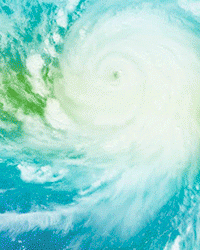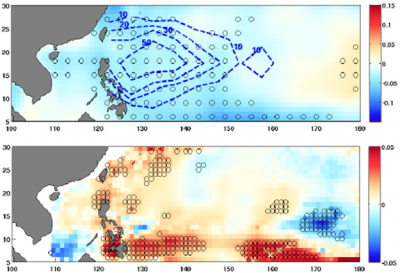Decreased Upper Ocean Salinity Helps Intensify Super Typhoons
Freshening at the upper-ocean causes tropical cyclones to intensify by increasing the stability of the water column and, consequently, reducing the vertical mixing and sea-surface-cooling caused by the cyclone. In the northwestern tropical Pacific, more surface freshening by increasing rainfall over the last 50 years has made the air-sea thermodynamic environment more conducive to intensifying super typhoons, a.k.a. intense tropical cyclones. With rainfall projected to increase in this region because of global warming, this freshwater effect will likely amplify in the future.
Each year, super typhoons devastate many East Asian countries and Oceania islands such as the Philippines. A team led by Pacific Northwest National Laboratory provided the observational evidence that reduced upper-ocean salinity in the northwestern tropical Pacific Ocean during the period 1961-2008 tended to strengthen super typhoons. Further, they found that climate models project a similar future trend as increased rainfall will continue to freshen the ocean. The freshwater effect, in combination with rising sea levels, suggests increasing impacts from super typhoons under global warming. This highlights the importance of accounting for changes in salinity, in addition to changes in the ocean’s thermal structure, to better understand and project changes in future super typhoon intensification.
Super typhoons, the intense tropical cyclones of the northwestern tropical Pacific, are some of the most destructive and deadly storms on the planet, affecting many East Asian countries and Oceania islands each year. The violent winds of these storms cause a deep mixing of the upper-ocean, resulting in strong cooling of the sea surface and making super typhoons highly sensitive to the oceans’ density stratification. A few previous studies examined the potential impacts of changes in upper-ocean temperature on future tropical cyclones and noted the suppression effect of temperature changes on tropical cyclone intensification. However, they did not take into account changes in near-surface salinity, which tends to intensify super typhoons by reducing their ability to cool the upper ocean. In this study, the team developed a method to isolate the effects of ocean salinity and temperature changes on tropical cyclones in observations and climate model projections for the future. They found observational evidence that freshening in the northwestern tropical Pacific between 1961 and 2008 has a strengthening effect on super typhoons, and this effect is 53% stronger than the suppressive effect of temperature changes. From an ensemble of climate model projections, they further demonstrated that in the future the strengthening effect of freshening nearly cancels the suppressive effects of ocean thermal structure changes reported in previous studies.


